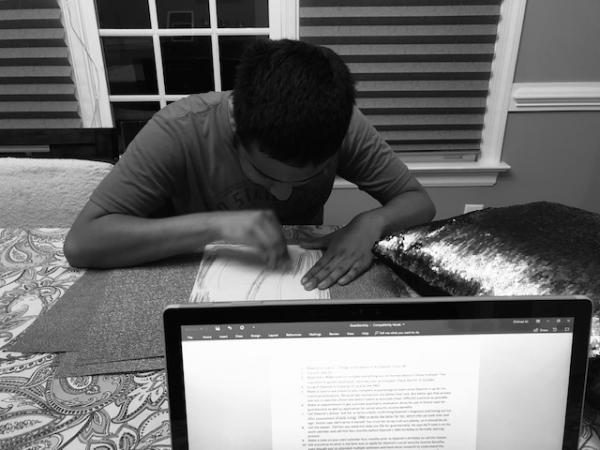
Some background:
I went to a ladies’ lunch recently and sat with some lovely friends who I’ve known for years. All of our eldest children are either 17 or 18 years old and in their senior year of high school, fully entrenched in the SAT-college-application-essay-writing-decision making process. We talked about how quickly time passes and the strange motherly emotions one has when your firstborn is about to head off into the great wide open of college and post-high school life.
I smiled, nodded and genuinely felt their joy and worry, even though my experience with my eldest has been vastly different. And (yeah, I’m patting myself on the back), I refrained from turning the conversation towards autism – that my latest experiences with D has been centered on helping him obtain social security income benefits and becoming his legal guardian, with all it entails. Because, the conversation doesn’t always need to shift to that. Senior year experiences and emotions for teens and their parents are also valid and important. Hell, I have a 15-year-old who will soon be right there.
But, with guardianship now officially behind us, I’ve been in awe at everything that has happened this past year for D and for us as a family. When he was younger, I often thought about his seventeenth-going-on-eighteenth year of life, somewhat dreading everything it would mean and how I was approach it. I didn’t want to make it about my emotions and turn it into a pity-party, which is far from what D deserves. But, I couldn’t bury my honest, mixed-up feelings either. I couldn’t project them upon him, but I had to fully own them without shame and without resentment towards the vastly different experiences of friends around me.
So, this was our reality the past year. If you’re a regular reader of this blog, you’ll know that I’ve written on this topic several times in the past year, so this will not be unfamiliar to you. But it’s surprising-not-surprising how much of this is foreign to the public at large.
If you have a child with a disability, as he or she approaches his 18th year, you have some decisions to make. It’s surprising how many folks do not understand this. But in the United States, when a person turns 18, they are legally considered an adult. This means they are responsible for their own self, including financial, educational and medical decision making. As a parent, you can’t have access to their medical records unless your child gives you permission. Or open a bank account for them (or have access to their account) without permission. Or do a bunch of other things.
In the disability world, this is a big deal, especially if parenting means you need to be actively involved in all these types of decision making throughout your child’s adult life. So, you need to seek a legal ruling to allow you to continue parenting and supporting your child in the way that best benefits him or her.
I’ve been aware of this and a lot of other things I knew I needed to take care of for my autistic son as he approached his 18th birthday. It rather consumed me the past year – emotionally and physically in ways difficult for those closest to me to understand. So, I thought I’d list it out, as a way to document and justify my struggling emotions to myself (which really need no justifying), and as a way to provide a window in this quiet life that so many are living in plain sight around you. In 25 steps starting on or a bit before D’s 17th birthday, here goes:
- Make a list. Call it – “Things to Do Before or As D Turns 18”
- Cry over said list.
- Wipe tears. Make sure list includes everything I’ve learned about in those multiple “The transition to autism adulthood” seminars I’ve attended. Check the list. Get started.
- Go with D and his siblings to make an ID card at the DMV. This will take place of a driver’s license as his official form of ID.
- Make a note to ask school to complete a psychological exam since D is up for his triannual evaluations. Better get a private one done too in case the school one doesn’t paint as accurate (read: difficult) a picture as possible. Because two evaluations are better than one.
- Make an appointment to get a private psychological evaluation done for use in future case for guardianship as well as application for social security income benefits.
- Call D’s doctor. Ask her to write a letter confirming his diagnosis and listing out his ADLs (assessment of daily living). Offer to write the letter for her, which she can look over and sign. Doctor says she’ll write it herself. I trust her to lay it all out plainly, so it should be ok.
- Call the lawyer. Tell him, “I need him help you file for guardianship.” He says he’ll note it on his work calendar and call him four months before D’s 18th birthday to formally start the process.
- Make a note on my own calendar four months prior to D’s birthday to call the lawyer.
- Ask around as to what is the best way to apply for D’s social security income (SSI) benefits, even though I’ve attended multiple seminars and have done research to understand the process. It still doesn’t make total sense, and there are conflicting pieces of advice to sift through.
- Press pause on SSI, since there still is time for that, and work on the umpteen evaluations, annual paperwork, toggling between case managers and chasing down additional paperwork to help facilitate D’s transfer from one Medicaid waiver to another, for which he had been on the waiting list for more than eight years. The process is a cursed blessing.
- Hey, it’s four months until D turns 18. List says call the lawyer, so I do.
- One month later, call the lawyer again to get an update. Mark the calendar to call him every month. Drop off additional support documents to him.
- Three months until D turns 18. Call the 1-800 number for social security, spend an hour on hold and then make an appointment to apply for D’s SSI benefits. Appointment is in June. Wonder if it’s too far away from D’s actual birthday in August.
- Talk to people about appointment date. Get conflicting information.
- Make the decision not to attend niece’s high school graduation in California. I love her and am super proud of her, but someone needs to stay home with D, and I just don’t think I can handle her graduation when the path has been so different for D.
- Worry some more about making a mistake and somehow jeopardizing D’s SSI application.
- Call the 1-800 number for social security one week before June appointment and take a different appointment two weeks before D’s 18th birthday.
- Call the lawyer. Eighteenth birthday is fast approaching. What’s going on? Lawyer says he has picked a guardian ad litem (court-appointed guardian) for D and has asked him to serve D papers instead of having the sheriff coming to our home.
- Sheriff? What is he talking about. Listen to lawyer explain how we are in affect suing D to take away his rights.
- I can’t believe we are suing our own son. Cry.
- SSI appointment – go in with a prepared file that includes the psychological evaluations, doctor’s diagnosis letter, most recent IEP, list of all doctors with phone numbers and other pertaining support documents. Take D along. Let the folks in social security see full-blown autism at its finest.
- Celebrate D’s 18th birthday. Let it sink in. This day has come. It is a fantastic day with family and friends who are right there with us in this autism living.
- Go for a second SSI appointment two weeks after his birthday, after receiving a letter saying that D was indeed deemed disabled (tell me something I don’t know), at which we are informed that he has been approved for SSI benefits. A month later the first check for $750 dollars paid by the government to D will arrive. Take a picture of D holding his check, which in a bittersweet moment I realize is his first ever paycheck, and that he is getting paid for being disabled. I am simultaneously grateful and heartbroken.
- On September 21, go to court with our lawyer and the guardian ad litem and be declared D’s legal guardian and conservator of his finances. D is not present on this momentous day that is 18 years in the making. He is in school, which is a much better place for him than this serious, protocol-driven courthouse. The judge tells us as per our legal suit against our son, he is now not be allowed to drive or own a firearm, although he can vote. I bury that knowledge deep and step across the hall to the County Clerk’s office to sign the paperwork. With that, the final period is placed on this particular year of steps and sentences in his and our lives.
But this is not the end of anything. This is the start of everything to come.
Three days before we go to court, I write this:
D’s appointed guardian ad litem came over today to serve him the final set of papers that will have us going to court in a couple of days to stand in front of a judge and receive his or her ruling on our guardianship petition. I’m always struck by the legal language in all of this, which I understand is a necessary thing, but it paints the process in such harsh, stripping terms.
In bold type there is a WARNING message on the “notice of hearing,” which basically is spelling out to D that at this hearing, he is losing his rights and that his co-guardians (his Baba and I) will be appointed to making personal, medical and financial decisions for him.
And yeah, legally speaking that is what is happening. But for the better part of a year I’ve worked to convince myself that although this NEVER was what I had envisioned D and us to be doing when he turned 18, we are all in this together, and his rights will always be his rights. We are just securing the means to continue doing what we’ve always been doing as his parents.
It’s funny, isn’t it? That we need a legal ruling to be the parents we want to be, need to be, for our son? But that’s how the law works. I get it. But, well, yeah.
And, I’m sure the elders of my family continue to wonder why I share such family happenings with the world. Some things I’ll never share. But this I will, because these are our autism truths. There is no shame in this. There can be pain and heaviness in this, and that’s all right too. I own that. This is the reality for many families living with disabilities — not all, but many.
When the final period is put on this particular sentence in his and our lives, we will still always work to keep D’s rights, needs and choices at the forefront of everything. That’s his haqq, his right over us. Because as the Quran says, which favors of Your Lord would you deny?
So ends the list of “Things to Do Before or As D turns 18.” I started writing these posts when D was about 11 years old. It’s hard to believe we are where we are now. But as this chapter ends, the next one is already being written, already being lived, with no more time to pause and reflect than the time it took to write this.












